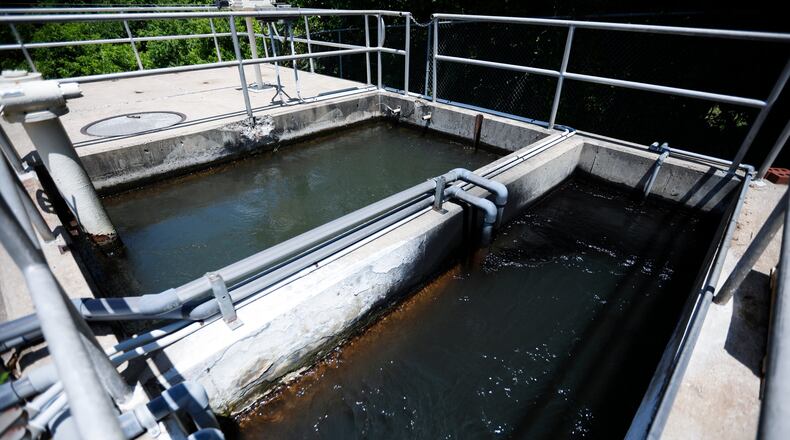While the region looks ahead to the 2025 opening of the Hyundai plant, counties and development authorities are racing to install the necessary infrastructure before the South Korean car manufacturer can open its doors.
The 3,000-acre megasite, soon home to the state's first EV factory, is "raw," according to Trip Tollison, CEO of the Savannah Economic Development Authority. That means there's no water, no sewer, barely any power and no paved roads.
Credit: Nathan Papes/Springfield News-Leader
Credit: Nathan Papes/Springfield News-Leader
"But you don't get these massive facilities or small facilities without it," Tollison said of the necessary infrastructure. "So, you have to plan ahead. You have to get it in the ground. You got to test it. You got to design it, you got to construct it."
The plans to install water and sewer capacity on the site rely on cooperation between three counties, the creation of four new drinking water sources, and the construction of a new wastewater facility. And while the infrastructure improvements will help increase water and sewer capacity for the megasite, the upgrades will also serve as a short-term solution for the anticipated residential growth of northern Bryan County, seen in the construction of additional industrial parks and neighborhoods such as Heartwood, to be built about a 45-minute drive from the site near Richmond Hill.
Credit: Richard Burkhart/Savannah Morning News
Credit: Richard Burkhart/Savannah Morning News
Water and sewer are not as glamorous as 10,000-home subdivisions or $5 billion factories, but those utilities provide the necessary infrastructure for growth.
"These aren't fun things to talk about because everybody expects it. Nobody thinks about water and sewer because it's always a given," Tollison said. "But you can't expand communities, you can't expand even schools. You can't do anything without it."
To meet the future demand on water and sewer infrastructure from the megasite, the region is tackling expansion through two distinct projects. Here's a look at what they are.
New wastewater facility coming to Bryan County
Construction of a new wastewater treatment plant is underway in Bryan County. The facility is being built specifically to meet the needs of the megasite and the northern part of the county's growth.
The reclamation facility will sit on megasite property and include two new pump stations and a new "force main," or pressurized pipeline, that will carry waste east along the Interstate 16 corridor towards existing pump stations, according to the regional sewer plan submitted as part of the Hyundai deal.
Credit: Savannah Harbor I-16 Corridor JDA
Credit: Savannah Harbor I-16 Corridor JDA
"It's going to be a permanent regional wastewater facility that Bryan County will operate... this facility will accommodate long-term and short-term wastewater needs for not only north Bryan County, but it could serve southern and western Chatham and southeast Bulloch as well," Tollison said. "The sewer, it's a big deal for long-term success — and not just Hyundai, but the whole region."
The Hyundai plant will discharge treated waste into the Ogeechee River, creating a point of concern for the Ogeechee Riverkeeper Damon Mullis, who is charged with protecting and advocating for the Ogeechee River and its watershed.
"We're obviously really concerned about just that point source," Mullis said.
The now-closed Milliken Plant upriver from the megasite had a similar permit to discharge waste into the Ogeechee River, which once caused a massive fish kill when chemicals were released into the water.
Bryan County put out a bid on the site in October 2021, with construction slated — and necessary — to be completed before the Hyundai plant's 2025 opening.
Credit: Courtesy of the Savannah Economic Development Authority
Credit: Courtesy of the Savannah Economic Development Authority
Four water wells to be dug in Bulloch County's 'green zone'
Drinking water is an obvious and necessary piece of infrastructure required for communities to grow. For the megasite, Tollison said four new wells are to be dug in southern Bulloch County specifically for the needs of the Hyundai plant.
The wells are in the upper Floridan aquifer's "green zone," meaning the water is abundant with no risk of saltwater intrusion. In parts of Chatham and Bryan counties, saltwater intrusion has rendered those sources in the yellow and red zones, meaning increased demand on the aquifer could worsen the already-salty waters.
Credit: Savannah Harbor I-16 Corridor JDA
Credit: Savannah Harbor I-16 Corridor JDA
By pulling from the green zone, Tollison said, the megasite's water source will remain stable.
But the solution isn't a cure-all for the long-term, regional needs for drinking water. It's meant to provide a "short-term solution" for the next two decades, Tollison explained.
"Ten to 20 years may seem like a long time, but this is sort of an interim solution while we really work to expand a surface water from the ID plant going west," Tollison said, referencing Savannah's water intake plant along Abercorn Creek.
Credit: University of Georgia
Credit: University of Georgia
Dozens of miles of new pipelines will be installed to carry water to the megasite from the wells in Bulloch County. Like the sewer improvements, the new water lines will need to be installed and operational by the time Hyundai comes online in three years.
Tollison said the temporary fixes will give leaders time to figure a long-term solution to water and sewer woes, including "weekly" conversations about expanding water resources with the city of Savannah.
"The next step is getting that surface water extended, because that absolutely has to happen for long-term growth."
Zoe covers growth and how it impacts communities in the Savannah area. Find her at znicholson@gannett.com, @zoenicholson_ on Twitter, and @zoenicholsonreporter on Instagram.
This article originally appeared on Savannah Morning News: Hyundai plant: What you need to know about water, sewer infrastructure related to megasite
The Latest
Featured





